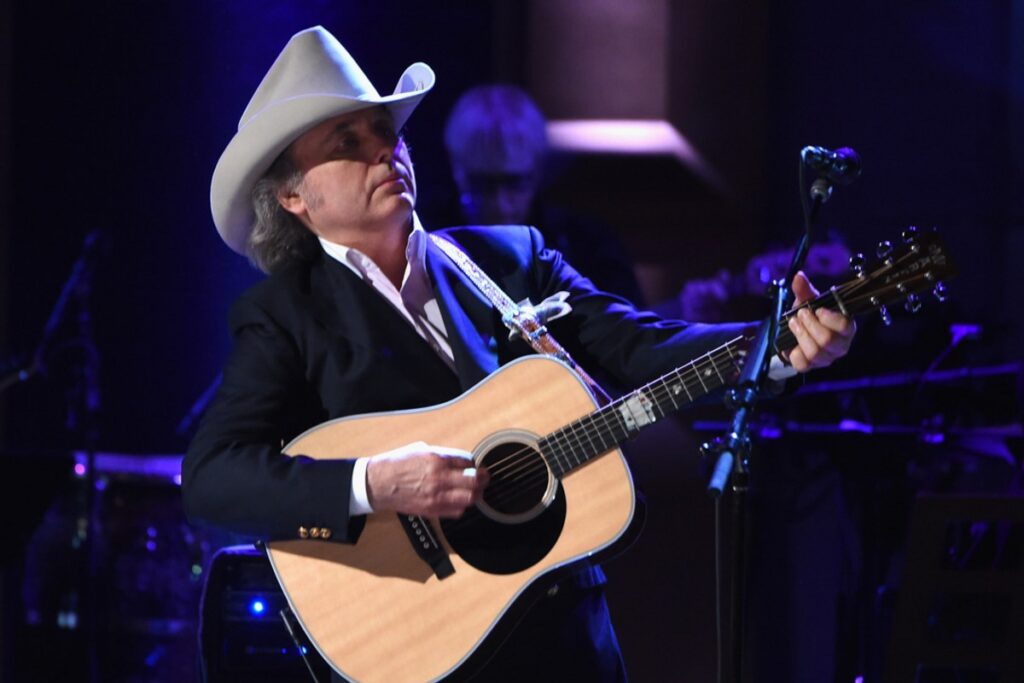
A barstool prayer for the broken-hearted—Dwight Yoakam turns “Two Doors Down” into a quiet ritual of surviving the night, one jukebox glow at a time.
Let’s set the essentials where you can see them. “Two Doors Down” is an album cut—not a single—on This Time (Reprise, March 23, 1993). Co-written by Dwight Yoakam and Kostas, it sits mid-album (track 5), clocks in around 3:52, and carries the clean, steel-bright production of Pete Anderson. Because it wasn’t issued as a single, there’s no standalone chart peak; instead, its parent LP tells the commercial story—No. 4 on Billboard’s Top Country Albums, No. 25 on the Billboard 200, and ultimately triple-platinum in the U.S. Those facts frame the song’s life: a beloved deep cut on the biggest album of Yoakam’s career.
There’s a small artistic backstory worth keeping close. This Time is the record where Yoakam and Anderson stretched the Bakersfield template—opening the windows to let early rock & soul drift through the honky-tonk air. Critic Thom Jurek singled out “Two Doors Down” as a “stunning example” of the Yoakam–Kostas partnership’s texture and tone—evidence that the singer had found a co-writer who could match his instinct for melody with emotional grain.
On the studio floor, you hear restraint doing the heavy lifting. The rhythm section lopes without hurry; the Telecaster answers Yoakam’s lines like an old friend who knows when to keep quiet; Al Perkins’s steel sighs at the edges; harmony voices—Beth Anderson, Jim Lauderdale, Tommy Funderburk and company—bloom and then step back. It’s Anderson’s signature minimalism: leave air around the vocal so the story can breathe. The album credits confirm the cast—Taras Prodaniuk on bass, Jeff Donavan on drums, Skip Edwards on keys, Anderson on electric guitar—pros who play for the song, not the spotlight.
And what a story it is—plainspoken, lived-in, and, for many of us, painfully familiar. The narrator has built himself a little survival route: a jukebox, a barstool that “knows [him] by name,” a short stumble between the hotel and the bar where memory hurts a little less. It isn’t melodrama; it’s routine—the kind of coping that older listeners recognize from hard seasons when you can’t fix the thing that broke, so you learn how to carry it. The song keeps its promises modest: no vows to “get over you,” only the truth of how people actually get through the hours between dusk and sleep. It’s that honesty—no glamour, no self-pity—that makes “Two Doors Down” feel like company instead of therapy. (If you know the lyric well, you also know its rueful wisdom: the “freedom from sorrow” he chases is always temporary.)
Part of the cut’s staying power is how it sits inside the This Time arc. The album gave radio its big, unmissable singles—“Ain’t That Lonely Yet,” “A Thousand Miles from Nowhere,” “Fast as You”—but the deeper tracks are where the record breathes. “Two Doors Down” is the slow exhale between choruses that storm the charts, the song you remember on the drive home when the dashboard lights feel too bright. It’s also a concert keeper: when Yoakam issued Dwight Live in 1995, the tune held pride of place mid-set, proof that fans were carrying it in their pockets even if it never wore a radio crown.
The story didn’t end in the ’90s. In 2016, Yoakam took a detour through bluegrass on Swimmin’ Pools, Movie Stars…, recutting favorites from his catalog—including “Two Doors Down.” The bones held beautifully: the melody and lyric settled right into fiddle, mandolin, and close harmony, and reviewers noticed how he leaned harder into the loneliness than in the early-’90s take. A song that once felt like neon and Formica suddenly glowed like woodgrain and varnish—same heart, different room. That second life quietly confirmed what longtime listeners already knew: the writing here is sturdy enough to wear new clothes without losing its shape.
Meaning, then, in a sentence? “Two Doors Down” is about the rituals we build when love leaves a hole it can’t refill. Not grand gestures—rituals. The places we go, the small kindnesses of strangers, the predictable loop of a favorite record when we don’t trust our thoughts. If you’ve lived long enough to see sorrow become a roommate, the song’s plain talk feels like mercy. It doesn’t ask you to move on before you’re ready. It just sits with you awhile, keeps the glass from emptying too fast, and lets the night turn into morning without demanding a miracle.
A few pins for the scrapbook: Artist: Dwight Yoakam. Song: “Two Doors Down.” Album: This Time (1993), track 5; writers: Yoakam & Kostas; producer: Pete Anderson; length: ~3:52; not released as a single. Album peaks: No. 4 (Top Country Albums), No. 25 (Billboard 200), ultimately 3× Platinum. Notable appearances: performed on Dwight Live (1995); re-imagined on Swimmin’ Pools, Movie Stars… (2016). All told, it’s a small masterclass in truth-telling—the sound of a grown man admitting what the night does to a tender heart, and finding, two doors down, just enough light to carry on.